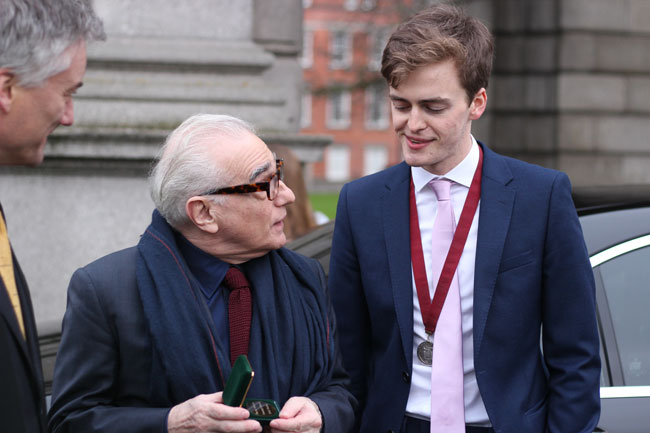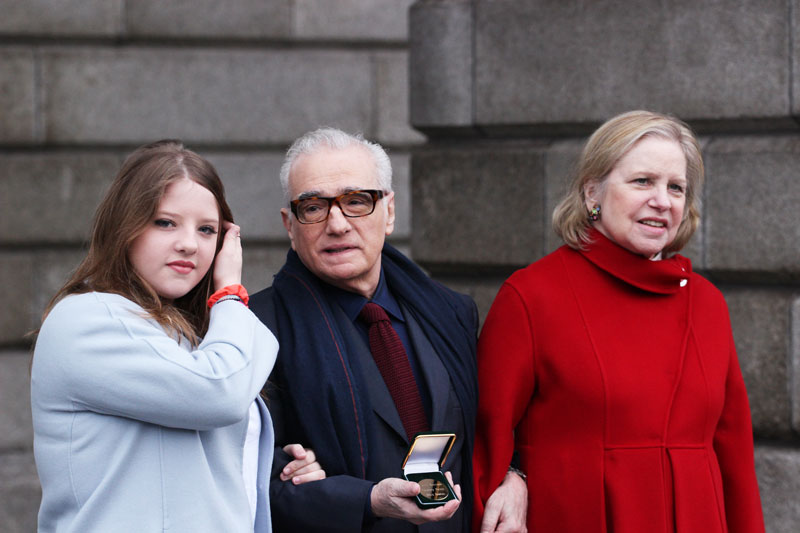He’s smaller than you might imagine. His large infamous spectacles magnify his eyes guarded by wildly unkempt eyebrows, conveying wisdom rather than conforming to a caricature. He sinks snugly into the grand wooden chair, and manages to command the vast room of Trinity’s Public Theatre in his own unique way. He sits comfortably asserted, giving off the impression that he prefers to listen, rather than pontificate. The violence, swearing and debauchery of which define a great proportion of his most revered work is slightly at odds with the juxtaposition of the astute, docile man at the top of the room. This gentle soul from the New York borough of Queens has been heralded as a master visionary, an exemplary voice in the film world. It’s no wonder his career has spanned over five decades. No wonder De Niro, Keitel, Pesci and DiCaprio keep coming back for more. Martin Scorsese is the personification of his craft – a graceful, nimble storyteller.
After a brief customary photocall in front of the Campanile in Front Square with Provost Patrick Prendergast, the venue of choice was the Public Theatre, better known as the Exam Hall, with the University Philosophical Society (the Phil). Hundreds of eager fans gawked back at the doors with a steady mix of anticipation and reverence. Scorsese shuffled into the room, wide-eyed and appreciative of those in attendance. Although swimming in accolades from many institutions such as the Golden Globes, AFI and the Cannes Film Festival, The Academy consistently overlooked Scorsese’s directorial skills, choosing instead to lay the acclaim at the feet of his actors. It was Boston-based drama The Departed in 2008 that finally clinched that long-overdue Academy Award for Scorsese. The ensemble cast, its swirling, wonderfully-crafted narrative structure pins together all of his strengths in one, unbreakable fabric. When questioned on how this plot-driven film came to being, Scorsese noted the absence of such works in his repertoire. It was not so much an aversion to plots, but instead a fascination with character which had occupied him for so long. He notes how the plot for The Departed was lost at many points throughout production, finding difficulty in this narrative structure. “Eventually, I lost track of the plot”, he conceded, before reeling it back in. While he grappled with plot, the studio rejected Scorsese’s insistence that a main character be killed off in an unexpected twist. “The studio said he had to have him live so that they can do the franchise. .. And I said, what franchise?” While he noted the kindly, gentlemanship of the studio heads, he admitted that their opposing approaches made for a challenging push to end the film the way he intended to shoot it.
Scorsese remained perpetually perplexed at their purpose when pushed to explain his opinion on Hollywood’s obsession with sequels. Firmly, he reasoned that sequels simply do not agree with him as a person. His dismissal stems from the realisation he had, when it became clear that his personal life would suffer, should he infuse a character or story with undue longevity: “I live with it. I’m in it – until it’s finished. And then I never want to see it again.” He noted the subtle difference between the position of actors and directors, in that Robert De Niro can return home for the evening and simply rid himself of his character. Scorsese finds difficulty in emotionally letting go of the material because, ultimately, it is his vision and inner workings which drive his films.

Inevitably, the conversation stumbled on Taxi Driver. It’s been 41 years since Taxi Driver stunned audiences the world over. Travis Bickle’s self imposed exile in his bright, lucid yellow Manhattan cab remains a marker for the deeply flawed protagonist. Insidiously and quite subtly, Bickle descends into insanity, guarded only by De Niro’s charming surface interactions. He deftly exemplifies the ease of which a deeply troubled and tortured individual can survive in the world unbeknownst to those around him. Scorsese commented on the parallels between the surrounding climate in which this film was conceived, with the current political landscape. He maintained that Bickle’s impulses are instinctual, derived from the universal sentiment of being an outsider, “that sense of isolation, and the outcast. We all identified with those aspects in adolescence. But I think it goes much deeper … much deeper. Ultimately, it’s God’s Lonely Man. Which is what we all are”.
The difference with Bickle however, is that he acts on his urges outwardly. De Niro masterfully toes the line between the charming facade, intent on saving an underage prostitute and the true, malicious intentions to selfishly deploy harm in favour of his own warped perception of the Greater Good. While Scorsese revelled in discussing one of his most revered works, he touched on the poignancy and the truth it reveals in our society, which tragically is still of relevance today. He likened Bickles crippling sense of isolation to the aftermath of the 9/11 attacks and how society and the Administration at the time were effectively “creating thousands and thousands of Travis Bickles”.
Known for his lifelong collaborative actor relationships, Scorsese emphasised the need for developing an environment for trust to manifest. His admiration for actors stems from his storytelling parents and his early introduction to the films of Elia Kazan. Over the course of his talk, Scorsese made numerous references to the inimitable Kazan, citing his influence as monumental to his own works. He explained how De Niro’s acting method is sensitive to the most minute changes of which Scorsese must be adept at dealing with. Over time, through collaborations on films such as Mean Streets, Taxi Driver and Raging Bull, they developed an intimate rapport whereby they would drop ideas in the midst of filming to a point where it became “don’t tell me, show me. I’ll shoot it”. He noted how trust developed out of their process and “it became a situation where we’re talking and it became more conversation, or interplay. Really a matter of life going on, rather than that sense of a scene simply beginning”.

Speaking to a roomful of the next generation, Scorsese touched on what it meant to him to be such an acclaimed talent and influencer. It was in the 1990s when he began to get a sense of the younger generation of filmmakers, maintaining that it is what propels him onwards. Like a true visionary, however, he angled the conversation towards the future. Scorsese revealed his fascination with new film enhancement technology such as 3D and Virtual Reality. While inklings of an audience panacea may prevail if these technologies catch on, he caveats their usage in the future: “How is that presented to an audience? What does that mean for the narrative?” He pushes that sentiment back on the audience, “well that’s for you, not for me”.
During the final moments of the Q&A, Scorsese was questioned on the effect of celebrity culture on the quality and artistry of films. He paused for a moment before conceding “sure, it’s the cart before the horse. There’s a great danger to it”. He credits his collaborator, De Niro, with pinpointing the nature of fame when he noticed a wealth of people craving what seemed to encircle him. Scorsese referenced his film The King of Comedy, which is based on the danger fame creates and likens the emergence of celebrity culture to a “monster that keeps being fed”. As if wanting to hammer down his beliefs to the wall, he emphasised the need to focus on the work, the tangible element, with fame only as the byproduct: “I’ve seen it happen. It just burns and burns until it burns out. It’s the work that matters.” Of course, he noted how there are elements of attractiveness in that sphere but he maintains that at the end of the day someone must be there in the editing room, doing the work, “believe me, one party’s as good as the next”.
Scorsese thanked the audience and, on the back of a rapturous applause, departed. As luck would have it, just this morning it was announced that streaming service, Netflix would bear the brunt of the estimated $100 million dollar budget to produce and distribute The Irishman, Scorsese’s next passion project which has spent years in production hell. All going well, The Irishman will succeed in reuniting the dream team of De Niro, Pesci, Keitel and Al Pacino. At the age of 74, Scorsese is as passionate and dedicated to his craft as ever. For him, it’s all about the work.







